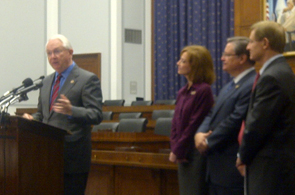WASHINGTON, Nov. 15, 2012- House Republicans released an “autopsy” today of the MF Global collapse in a report that criticizes the oversight of federal regulatory agencies.
“Whenever we have a failure like this there’s an urge for more regulation. In this case, we didn’t need more, we needed regulators doing their job,” said House Financial Services Subcommittee on Oversight and Investigations Chairman Randy Neugebauer, R-Texas, during a press conference today.
The Subcommittee's findings suggest a severe lack in communication about the state of MF Global between the Securities and Exchange Commission (SEC) and Commodity Futures Trading Commission (CFTC). When the regulators tried to coordinate in the week before the company’s bankruptcy, “it was disorganized and haphazard,” noted the report.
House Financial Services Committee Chairman Spencer Bachus, R-Ala., said the MF Global collapse is unprecedented due to the more than $1 billion in customer money that went missing. “This marked the first time in history of the U.S. future industry that a customer suffered a loss due to the mishandling of customer funds.”
He described the experience of an MF Global customer who lost $200,000 by liquidating his crop inventory after seeing his account inaccessible as a result of the collapse. “Maybe in a year they’ll get eighty percent of their money back, but what happens during that year? Please don’t get the impression that these people will be made whole,” Bachus said today.
“MF Global customers paid the price, not the regulators, not MF Global,” he added. “It was farmers, ranchers and rural communities that suffered when the regulators looked at each other, didn’t know things, didn’t coordinate.”
The report outlines former CEO Jon Corzine’s actions to transform MF Global from a futures broker to an investment bank “without having a complete understanding of the futures business or the potential risks associated with such a radical transformation.”
It also notes MF Global did not disclose its exposure to European sovereign debt, which it used customer funds to cover, in full until a full year after it began accumulating the positions.
“The company denied it had European exposure in September 2010, despite a nearly $2 billion portfolio,” according to the report.
Bachus noted he cannot decide if Corzine should be criminally charged, but there is “circumstantial evidence” that Corzine either directed or knew about the transfer of MF Global customer funds to the company’s broker-dealer arm.
MF Global existed jointly as a futures commission merchant (FCM) and a broker-dealer firm before the bankruptcy. The broker-dealer firm of MF Global placed the investments in sovereign debt. Corzine stated repeatedly during hearings on Capitol Hill he had “no recollection” of ever authorizing customer funds from the FCM to be used in sovereign debt investments.
While the report places the responsibility of MF Global’s failure on Corzine, harsh critiques are reserved for the regulatory arms responsible for overseeing the company, notably SEC and CFTC as well as credit and ratings agencies. According to the report, the New York Federal Reserve gave MF Global primary dealer status, “despite past risk management failure, chronic net losses, and untested business strategy.”
Bachus criticized the Dodd-Frank Act that created more than 400 more rules and 7,000 pages of new regulations. “But the one regulation that’s the most important is ‘don’t take customer money and trade with it or use it,’ which has been on the books forever.”
“This ought to be a wake-up call that it’s enforcing the law and not just creating laws upon laws and layers upon layers,” he added.
Among the report’s recommendations is one to streamline the operations of the SEC and CFTC, “or merge into a single financial regulatory agency that would have oversight of the entire capital markets.”
However, the Ranking Member of the Senate Agriculture Committee, Senator Pat Roberts, R-Kan., said today “it has been clear from the outset that Governor Corzine was largely responsible for what happened at MF Global.”
“Since the beginning of this bankruptcy, my concern has been restoring these lost customers’ segregated funds,” he said. “The CFTC has already made changes in an effort to prevent this from even happening again.”
Roberts rejected the notion that combining SEC and CFTC would create a better regulatory structure. “I don’t see how merging two regulators who regulate different aspects of our economy would have made any difference in Governor Corzine’s bad decisions or in preventing such a problem in the future.”
Congressman Michael Conaway (R-Texas), Chairman of the General Farm Commodities and Risk Management Subcommittee, called the report “a thorough account of the MF Global collapse,” but agreed with Senator Roberts that “the fact is, the CFTC and the SEC regulate markets that have fundamentally different purposes and serve investors that need fundamentally different protections. One regulator cannot fit all.”
“Do not assume the intent of this report was to provoke the perennial argument about merging the CFTC and SEC,” Conaway said. “We would do a disservice to our constituents if we read through this report and simply assume that a new super-regulator would have prevented MF Global.”
House Democrats did not sign onto the report released today, but will be giving feedback. “Not everybody is going to agree with this report,” Neugebauer noted. “But the purpose is to begin a discussion so that we can ensure in the future we don’t have customer money go missing.”
According to the Subcommittee, the year-long staff investigation of MF Global involved three hearings, more than 50 witness interviews, and the review of more than 240,000 documents obtained from MF Global, its former employees and federal regulators.
The full report is found here: http://financialservices.house.gov/uploadedfiles/256882456288524.pdf

This story was updated 11/15/12
#30
For more news, go to www.agri-pulse.com
